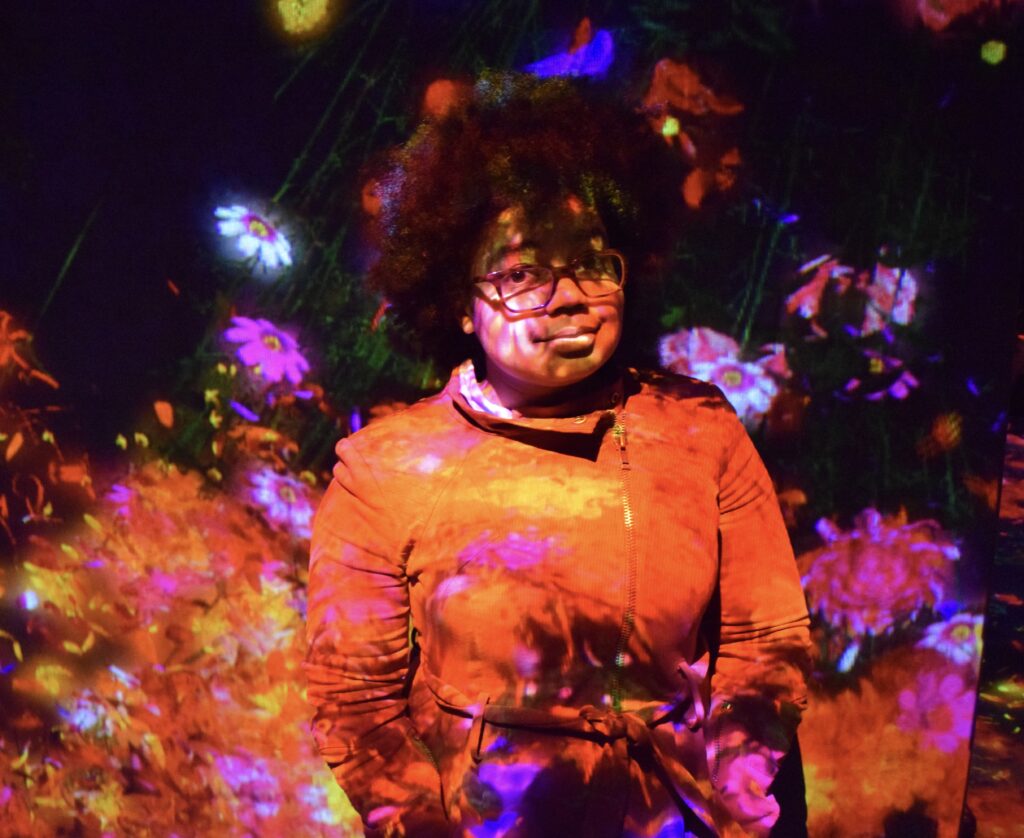
When I say that I’m a Black scholar who works on and in Japan, I think many people assume that I must work on Blackness in Japan. They’re often surprised when I say that I actually study anime, manga, and other 20th-century forms of popular media and wonder how I found my way into this line of work. I myself wonder that on some days when I’ve spent hours working through archival materials on the early 20th century recording industry in Japan or listening to fragmented recordings of radio programs from the 1960s! However, I think that it’s crucial to understand that there are so many journeys that can lead to being a Black academic in Japan and so many paths that one can take within that encounter. My journey has been one of learning to bring my whole self to my work, in a way that not only enhances my research but also challenges categories like “Japanese” or “Asian” and expands what kinds of ideas can be used when writing about these locales.
One of the questions I’ve gotten most frequently about my work is, “Why Japan?” or “What about your dissertation is specific to Japan?” And if I’m completely honest, I’ve never been able to give a satisfactory answer. This is because I can only say that “Well, I’M specific to this project about Japan.” It’s a bit facetious, but it reflects the kind of serendipity that has been central within my journey thus far. To a certain extent, I started studying Japanese literature by chance. In college, I wanted to major in comparative literature, a Japanese literature class was available and I wound up finding a lot of resonances between the texts I read in that class and my own experiences as a Black girl who grew up in a religious household in the American South. But even though I “fell in love” with “Japanese literature,” one of the things I try to do in my work is ask what the idea of “Japan” or “Japanese people” even means. For example, can someone really make an equivalence between people in Japan in the early 20th century and the early 21st century? What about listeners in Osaka versus listeners in Tokyo, versus listeners in Akita Prefecture? In a certain sense, the only common denominator when I conduct research is…well, me. And that doesn’t mean that my PhD dissertation is an autobiography. But it does mean that I try to be very explicit and conscious about what my identity as a Black, American researcher brings to the table when I engage with my research. For example, when I write about the early recording industry in Japan, I not only discuss my experiences as a modern researcher trying to listen to the faint sounds of degraded audio but also incorporate ideas from robust theorizations within sound studies about early audio recording within the African diaspora.
Even so, I think it’s important to note that while serendipity brought me to the field of Japanese media studies, I was kept there through relationships with supportive teachers and friends. I feel very lucky that my initial Japanese language education at Williams College was incredibly inclusive and avoided many of the microaggressions that other Black and Brown students have faced in language classrooms. I actually didn’t start studying Japanese until my 3rd year, but I was never made to feel as if there were limitations to what I could do with the language. Additionally, I have been a visiting researcher in Tokyo since 2018, and I’m so grateful for many of the connections I’ve made with scholars here who have taken an interest in me as a person, even beyond my work, and have been kind, considerate mentors and interlocutors.
However, it’s important to take a clear and honest look at the obstacles and barriers that young Black scholars face when approaching careers in Asia or in Asian Studies. This was one of the driving considerations behind the petition in support of Black scholars I co-wrote with other scholars to the Association for Asian Studies, and it’s why I’m so glad to have joined an organization like NABEA. Having a platform, more than that, a community, to connect with other Black scholars is crucial to feeling as if you’re not the “only one.” It also gives us a chance to fight against tokenism and highlight the diversity that comprises being Black in Asia. There’s no one way to be Black, and there’s no one way to experience Asia as a Black person. I’m excited to be a part of NABEA and build a network of support that can highlight the importance of Black lives growing in and with Asia.
You can follow Kimberlee at her personal website: https://kimberleesanders.carrd.co
~~~~~~~~~~~~~~~~~~~~~~~~~~~~~~~~~~~~~~~~~~~~~~~~~~~~~~~~~~~~~~~~
If you identify as Black American or African-American, join our Slack community to connect with other Black Asia experts by filling out our Slack sign-up form! Also, fill out the Database sign-up form to be added to NABEA’s Database, a publicly accessible resource for institutions to find Black Americans across academia, government, and private sector industries who specialize in the Indo-Pacific.
If you do not identify as Black American, sign up for the listserv to receive newsletters and stay up-to-date on NABEA’s activities and programming. Also, please spread awareness by sending this information to any Black American, Asia specialists in your network.
